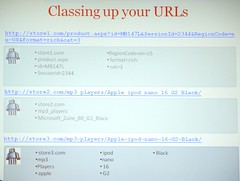AT&T Acquires YP.com for $3.85 Million
![]() AT&T has acquired YP.com for $3.85 Million. I distinctly recall back when AT&T previously bought YellowPages.com in for $100 million in 2004. Does this make sense?!?
AT&T has acquired YP.com for $3.85 Million. I distinctly recall back when AT&T previously bought YellowPages.com in for $100 million in 2004. Does this make sense?!?
Back in 2004, I laughed and laughed and laughed, and I told coworkers that it was a huge waste of money, because, I said, “they won’t be able to buy themselves into the top position for searches for ‘Yellow Pages'”. SuperPages.com long held that distinction under my SEO direction, and I knew that purchasing the term in a domain name alone would not depose all the work we’d done to rank tops for it. As time passed, however, yellowpages.com has indeed deposed the Superpages forerunner. (more…)
Possible Related Posts
Posted by Chris of Silvery on 01/14/2009
Permalink | |  Print
| Trackback | Comments (0) | Comments RSS
Print
| Trackback | Comments (0) | Comments RSS
Filed under: brand names, Domain Names, Online Directories, Search Engine Optimization, SEO, URLs, Yellow Pages AT&T, Domain Names, Yellow Pages, yellowpages.com
Flickr *IS* Good for Search Marketing – Despite Naysayers!
I’ve seen a recent article or two claiming that Flickr can no longer be leveraged for SEO purposes. As frequent readers here know, I’ve long been a proponent of using Flickr, both for its great Web 2.0 features, but also for its marketing/promotional value. I’m sure I’m one of the people that article writer was thinking of when he mentioned hearing recommendations for use from other articles and search marketing conferences.
Flickr can still be a valuable source of internet promotion, and a great tool for the purposes of Image Search Optimization. Read on and I’ll explain. (more…)
Possible Related Posts
Posted by Chris of Silvery on 01/14/2009
Permalink | |  Print
| Trackback | Comments (0) | Comments RSS
Print
| Trackback | Comments (0) | Comments RSS
Filed under: Image Optimization, Marketing, Search Engine Optimization, SEO flickr, image SEO, image-search, SEO
Yellow Pages & Blog Payola
Ed Kohler, outspoken critic of YP industry, “outed” DexKnows.com for using Pay-Per-Post to increase links and associated PageRank for their site.
As you may know, Pay-Per-Post involves paying bloggers to write articles endorsing products, services or companies, and in this flavor it also involves using those posts to link back to the company’s site in order to help build PageRank.
The blog post is very thinly disguised payola – as Kohler points out, the blog is purportedly belonging to someone in Arkansas, while this post appears to be all oriented around providing keyworded links involving Pizza in Minneapolis through DexKnows. The blog has a large “payperpost” ad badge on it, too, and if you read through the articles, every single one seems to be engineered to sound like someone writing about random daily life incidents, but always with a couple of injected keyword links.
In context, it’s glaringly obvious that the blog is a paid posting. Kohler posts a comment below it, asking if it’s a paid post for Dex, and the author replies that she doesn’t “know who’s Dex”.
Kohler further pokes fun at Ken Clark, a yellow pages industry advocate, (more…)
Possible Related Posts
Posted by Chris of Silvery on 10/03/2008
Permalink | |  Print
| Trackback | Comments (0) | Comments RSS
Print
| Trackback | Comments (0) | Comments RSS
Filed under: Best Practices, Blog Optimization, Link Building, Search Engine Optimization, SEO, Worst Practices, Yellow Pages dexknows, paid blogging, pay per post, Yellow Pages
MS Live Search Tip: Keyworded URLs
 I was pleased to sit in a presentation by Nathan Buggia last week at the Web 2.0 Expo conference in New York. Nathan is the Lead Program Manager for Microsoft’s Live Search Webmaster Center, and his talk was on “Getting More Traffic from Search: Advanced SEO for Developers“.
I was pleased to sit in a presentation by Nathan Buggia last week at the Web 2.0 Expo conference in New York. Nathan is the Lead Program Manager for Microsoft’s Live Search Webmaster Center, and his talk was on “Getting More Traffic from Search: Advanced SEO for Developers“.
One of the more interesting things that Nathan covered were factors which provide specific benefit to page rankings in Live Search.
It was striking when he covered one element in particular: URL formatting.
Nathan stated that URLs which were shorter and which contain valuable keywords are likely to provide greater keyword relevancy benefit to pages which have them. URLs which are shorter and which have richer words that describe a page’s content work better for endusers and for marketing purposes. Users seeing a keyword-rich URL are more likely to click on them when they see them in search results page listings, because they reinforce the perception that they contain what the user is seeking. URLs also should have keywords delimited by dashes, rather than underscores or even periods.
Check out this slide from his presentation which demonstrates how keywords within the URL can provide additional signal to a page for the terms they represent:
Have difficulty in adding keyword URLs to your site? This is one of the things which GravityStream provides automatically (or even manually-generated). GravityStream proxies a site in order to automatically optimize a great many search ranking factors, including keyword-rich URLs.
Possible Related Posts
Posted by Chris of Silvery on 09/22/2008
Permalink | |  Print
| Trackback | Comments (0) | Comments RSS
Print
| Trackback | Comments (0) | Comments RSS
Filed under: MSN Search, Search Engine Optimization, SEO GravityStream, Live-Search, Nathan Buggia, SEO
Why avoiding meta keywords tag may be best
Around a year ago, Danny Sullivan did some great research on the Meta Keywords tag to determine which search engines are using it. He found indication that Google and Microsoft Live Search ignore it for keyword ranking (retrieval) purposes, while Yahoo! and Ask are apparently using it. With Google having the bulk of the search marketshare, and Yahoo possibly only using the tag to a limited degree, it would seem rather extraneous to continue using it for search optimization.
Although his research was really pretty definitive in my mind, there are so many search marketers that have some sort of nostalgic devotion to the tag and who continue to obsess over it and insist upon using it. There is a sort of mentality that “if it might help, then I’m damn well going to use it.” (See this recent thread at WebMasterWorld where quite a few express this viewpoint.)
However, I see some compelling reasons to avoid using it altogether… (more…)
Possible Related Posts
Posted by Chris of Silvery on 09/15/2008
Permalink | |  Print
| Trackback | Comments (0) | Comments RSS
Print
| Trackback | Comments (0) | Comments RSS
Filed under: Best Practices, HTML Optimization, Search Engine Optimization, SEO, Worst Practices meta keywords, meta tag, metatags
Web 2.0 Conference: SEO 101 Workshop
 I’ll be delivering a brief course on the basics of SEO at the Web 2.0 Expo conference in New York, September 16th. The Web 2.0 Expo is co-produced by TechWeb and O’Reilly Media.
I’ll be delivering a brief course on the basics of SEO at the Web 2.0 Expo conference in New York, September 16th. The Web 2.0 Expo is co-produced by TechWeb and O’Reilly Media.
My course on “SEO 101” is a not-to-be missed session for any search marketer who wishes to learn the basics of “organic” or “natural” search engine optimization (a.k.a. “SEO”). While basic SEO principles are really very simple to incorporate in web site design, most companies fail to exploit them when building out their web pages and internet applications — losing out on traffic and marketshare. Adjusting a site to include just a few of the basics can increase traffic and associated sales significantly.
I’ll be speaking along with the legendary Neil Patel, who is renowned as a social media marketing guru. Neil will be covering the basics of social media optimization, or “SMO”.
Possible Related Posts
Posted by Chris of Silvery on 08/07/2008
Permalink | |  Print
| Trackback | Comments (0) | Comments RSS
Print
| Trackback | Comments (0) | Comments RSS
Filed under: Conferences, Search Engine Optimization, Seminars, SEO, Social Media Optimization Search Engine Optimization, SEO 101, SEO basics, SMO 101, Social Media Optimization
Australian Yellow Pages Finally Optimizes For Search Engines
 The Australian edition of Lifehacker reports that Sensis, Telestra’s yellow pages division, has finally allowed bots to crawl their online yellow pages so links to their listings are now showing up in Google SERPs and other search engines. Previously, they were apparently blocking Google and bots by either using robots.txt disallow rules and/or blocking the bots with network access rules.
The Australian edition of Lifehacker reports that Sensis, Telestra’s yellow pages division, has finally allowed bots to crawl their online yellow pages so links to their listings are now showing up in Google SERPs and other search engines. Previously, they were apparently blocking Google and bots by either using robots.txt disallow rules and/or blocking the bots with network access rules.

Australian Yellow Pages in Google results (click to enlarge)
Amusingly, Lifehacker mentions, (more…)
Possible Related Posts
Posted by Chris of Silvery on 07/24/2008
Permalink | |  Print
| Trackback | Comments (0) | Comments RSS
Print
| Trackback | Comments (0) | Comments RSS
Filed under: Google, Local Search, Local Search Optimization, Online Directories, Search Engine Optimization, SEO, Yellow Pages Australian Yellow Pages, local-SEO, Search Engine Optimization, Sensis, SEO, Telestra, Yellow Pages
The Long Tail A Myth? Study Calls It Into Question
A Wall Street Journal Article today cites a study by Anita Elberse, a marketing professor at Harvard’s business school, entitled, “Should You Invest in the Long Tail?“, which finds evidence that in the online world, consumers gravitate towards the most-popular items just as in the offline world.
The Long Tail, if you don’t already know, refers to a theory promoted by a book by Chris Anderson titled “The Long Tail”, which describes a sort of niche strategy of business, such as employed by Amazon.com or Netflix, that sell a large number of unique items in relatively small quantities. The idea is that while you can obviously sell large numbers of a few popular items (the “head”), the cumulative, smaller number of sales of all your many less-popular items (the “tail”) might easily add up to a far greater total amount.

“Head” items shown in red, “Tail” items shown in blue
Here at Netconcepts, we’ve been promoting the Long Tail concept in relation to natural search marketing for quite some time, since we’ve witnessed how its application can directly improve a business’s overall sales numbers. Indeed, businesses often get the most sales per item for their most popular products, but those products are also often the most competed on the internet, and sometimes the hardest to promote as a result. Even in the cases of top online retailers, we’ve seen that greater bulks of traffic and associated sales may often come from the bulk of less-popular Tail products. (more…)
Possible Related Posts
Posted by Chris of Silvery on 07/02/2008
Permalink | |  Print
| Trackback | Comments Off on The Long Tail A Myth? Study Calls It Into Question | Comments RSS
Print
| Trackback | Comments Off on The Long Tail A Myth? Study Calls It Into Question | Comments RSS
Filed under: Marketing, Monetization of Search, Reference Material, Research and Development, Search Engine Optimization, SEO Chris Anderson, niche marketing, The Long Tail
Privacy Policy Could Be Site Quality Signal
 Search engines have increasingly gotten involved in protecting endusers from hostile and intrusive elements on the internet, and they’ve also become more active in internet privacy issues as consumers are getting more educated about issues surrounding data privacy. Ask.com has tried to differentiate themselves by being progressive about communicating their data retention policy and by enabling users to define how long data is retained, for instance, while Google has revised their data retention policy as well as worked to aggressively block or warn endusers about websites containing adware, spyware, and other exploits. Yahoo! even recently paired up with McAfee to assess and improve the safety of sites displayed in their search results.
Search engines have increasingly gotten involved in protecting endusers from hostile and intrusive elements on the internet, and they’ve also become more active in internet privacy issues as consumers are getting more educated about issues surrounding data privacy. Ask.com has tried to differentiate themselves by being progressive about communicating their data retention policy and by enabling users to define how long data is retained, for instance, while Google has revised their data retention policy as well as worked to aggressively block or warn endusers about websites containing adware, spyware, and other exploits. Yahoo! even recently paired up with McAfee to assess and improve the safety of sites displayed in their search results.
One aspect of search rankings I’ve written about before is the theory of a site’s quality — a “quality score” very likely is applied by Google (and to lesser degrees, Yahoo! and Microsoft Live Search) to quantify how much they may trust a site for ranking purposes and for users’ safety. There are a number of factors which might feed into a site’s quality score (including Google’s human quality auditors’ scoring), and one major factor that could be used might be a site’s Privacy Policy. (more…)
Possible Related Posts
Posted by Chris of Silvery on 06/23/2008
Permalink | |  Print
| Trackback | Comments Off on Privacy Policy Could Be Site Quality Signal | Comments RSS
Print
| Trackback | Comments Off on Privacy Policy Could Be Site Quality Signal | Comments RSS
Filed under: Best Practices, Google, Search Engine Optimization, Security, SEO, Worst Practices data privacy, p3p, personal data, privacy, privacy policy, Search Engine Optimization, SEO, web spam
SMX Advanced Keynote Addresses
We’re at the SMX Advanced conference here in Seattle this week. It’s been very interesting, fun and educational.
The two keynote interviews were mentionable.
First on Tuesday morning, Danny Sullivan interviewed Kevin Johnson, the President of the Platform & Services Division at Microsoft:
Johnson spoke about their new Live Search Cashback program (this offers rewards back to consumers a cash back rebate for purchases made online). Johnson stated that they felt the future of online search marketing was headed in that direction. He also mentioned a number of times that Microsoft is dedicated to the concept of multiple choices in the marketplace for software and search services — something which made a lot of audience members chuckle a bit.
Related to Microsoft’s Cashback program, (more…)
Possible Related Posts
Posted by Chris of Silvery on 06/04/2008
Permalink | |  Print
| Trackback | Comments Off on SMX Advanced Keynote Addresses | Comments RSS
Print
| Trackback | Comments Off on SMX Advanced Keynote Addresses | Comments RSS
Filed under: Conferences, Google, Monetization of Search, MSN Search, Search Engine Optimization, SEO Kevin Johnson, Matt Cutts, Microsoft Live Search, SMX Advanced





